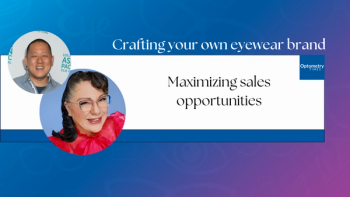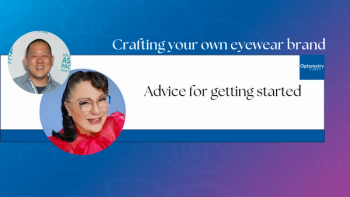
Meet the LEO founding board: Dr Diana Canto-Sims

Diana Canto-Sims, OD, sat down with Optometry Times®' assistant managing editor Emily Kaiser to talk about her role on the founding board of Latinos en Optometry (LEO).
Diana Canto-Sims, OD, sat down with Optometry Times®' assistant managing editor Emily Kaiser to talk about her role on the founding board of
Founded by Diana Canto-Sims, OD, LEO has 5 goals:
- Increase the number of Latino students in optometry schools
- Provide resources and communication for Latinos in optometry
- Provide resources and communication for the eye care community who serve the Latino community
- Be a conduit between the Latino community and the eye care industry
- Provide CE to all optometry
The founding board of Latinos En Optometry includes Diana Canto-Sims, OD, CEO, Founder and Stylist of La Vida Eyewear and Co-Owner of Buena Vista Optical in Chicago, IL; Lawrence Chavez, Founder & CEO of EveryDay Contacts; Howard Purcell, OD, President and CEO of the New England College of Optometry; Hector Santiago, OD, PhD, Professor and Director of Research Activities at Inter American University of Puerto Rico School of Optometry; Glenda Aleman Moheeputh, OD, Founder and CEO of OK Love Myopia Control Experts; Karen Carrasquillo, OD, PhD, Senior Vice President Clinical and Professional Affairs at BostonSight; Diana Shechtman, OD, Fellow at the American Academy of Optometry and Optometric Retinal Society; and Lina Arango, OD, who currently works as an Independent Doctor with LTA Vision corporation.
Video Transcript
Editor's note: This transcript has been lightly edited for clarity.
Emily Kaiser:
Hi, everyone. I'm joined today by Diana Canto-Sims to talk about Latinos en Optometry, or LEO. Thanks for joining us, Dr Canto-Sims.
Diana Cano-Sims, OD:
Thank you for having me. It's a pleasure.
Kaiser:
So first, can you tell us a little bit about the founding of Latinos en Optometry?
Canto-Sims:
Absolutely. I love all things business and optometry. I own my own practice, and I know that in optometry school they don't teach you a lot about running a business. So, I've always been inclined to doing business courses. There was a phenomenal course, a scaling program that I did, [that] was with Stanford Graduate Business School. It was a program to basically either create a growth opportunity or create more jobs and more business. There, I was introduced to Lawrence Chavez, [who] is also a Latino entrepreneur. He was doing the program at a different time, and his company has to do with contact lenses. So we were having a conversation about [the fact that] we don't really have a hub, or a place, that Latinos can get together, create, collaborate, and help the Latino community with vision in optometry. Wouldn't it be amazing if we could create that collaboration with the industry and with other professionals to help the Latino and Spanish speaking patients better? That's how LEO got started.
Kaiser:
That's so amazing. I love that, it's such a nice story. What does LEO represent to you?
Canto-Sims:
So, LEO is the eye care industry and Latinos, whether that be patients, students, graduates, new graduates, or Latino optometrist, or even non Latino optometrist that want to serve the Latino community. It is that conduit where we can all meet with the same goal, which is to create resources, tools, and continuing education for doctors to be able to better serve their Latino community and Spanish speaking community. We know and understand that not only is there a cultural challenge, but also a language challenge. When you're speaking to your patients and you're talking about a treatment, if you're not communicating effectively, if the patient is not understanding what you're saying, or there's maybe a cultural barrier, then the patient is not going to be compliant with the treatment that you give them. We want to remove those barriers as much as we can, so that we can be better doctors, and the entire industry can create resources and tools to better serve the Latino and Spanish speaking community, which has always been my goal. That was the whole point of me becoming an optometrist because when I was growing up, I was always a translator for my parents. So, by creating these tools, we can communicate so much better with our Latino and Spanish speaking patients.
Kaiser:
Absolutely. Why is LEO an important organization for the eye care industry?
Canto-Sims:
LEO is kind of an umbrella, so we do a couple of things. One of our biggest goal is to increase the percentage of Latinos graduating optometry school. The reason for this is, again, because if you have a doctor that looks like you, that speaks your language, that understands your culture, you are more likely to follow what they say and be compliant with your treatment. The reality is [that] when we look at the growth of the Latino and Spanish speaking population in the United States, it is huge. I mean, we have been multiplying for the past 10 years by a lot. I don't have the numbers in front of me, but it is estimated that there's just going to be more of us, more Latinos. When you look at the percentage of Latino optometrists or Spanish speaking optometrists graduating every year, that percentage is around, give or take, 6%. That does not reflect the amount of growth of the Latino population in the United States.
So one of our biggest goals is to start from the foundation. Creating inspiring projects to get undergrads that are looking into a career to consider optometry. We work with optometry students, [whether] they're Latino or non Latino, to make sure they know that they have the resources that they need to be able to better serve their Latino and Spanish speaking patients. We also want to offer continuing education and those resources and tools to non Latino doctors, [so] we can get all the help we can. If you tell me I have a resource to make you do your job better and more efficiently, send them over. [We are] creating these programs to be able to increase that percentage of Latino and Spanish speaking doctors graduating, graduating every year. Not just that, but also creating that support system to be able to really empower them [with] what they need to see these Latino patients. That's why it's so important, [and] we need the entire industry to get on board. That's why we've created this hub, where we can have all of these resources for students, that was very important to us. As a student, you can have all these resources for free.
Kaiser:
Yeah, that's so fantastic. Especially because you have to serve the entire community. And, even as you increase admissions into colleges and increase representation in optometrists and [the] industry, you're never gonna have 100% representation. So making sure that you're also supplying non Latinos with this education is so valuable, because you want to make sure everybody's taken care of and education saves lives.
Canto-Sims:
Absolutely.
Kaiser:
How do you hope to see LEO serving the community?
Canto-Sims:
Right now we have a couple of projects in place we are collaborating with [in] the industry. We have our supporters [and] sponsors. We do mentorship for undergrads and for optometry students. I remember being a student and kind of thinking; okay, so I graduate in a couple of months, now what what am I supposed to do? Where do I go? What do I do? I wish I had someone that could guide or mentor me, and LEO has a mentorship program. What is so beautiful, is [that] our board members all have a specialty. We have a retina specialist, contact lens, ortho-k, myopia, [and] we have board members in academia.
A lot of students don't even know [the opportunities] when they graduate. They sometimes think, I can go to corporate or I can open my own practice. If I don't have the money to open my own practice, I guess I'm going to have to go work for someone. A lot of students don't know you could do so many things with your optometry career. You can go into academia, you can go into research, you can you can work for corporate, you can work for [a] private practice. There are so many possibilities, and when you graduate, nobody tells you these things. A mentorship program with students is something that I wish I had, and I think is very necessary in our industry, not just for Latinos, because we we mentor non-Latinos as well. We think it's very important to incorporate that mentorship aspect into our nonprofit, because you got to get them when they're young. They're so young and bright eyed, [and] it's like okay, let me guide you because otherwise [there's] burnout and confusion, and we don't want that. Mentoring students is important, and undergrads as well, so that they are inspired for a career in optometry, and also the aspect of creating resources for that language barrier so doctors feel more empowered to be able to communicate the treatment effectively with their patients.
Kaiser:
Absolutely. What has been the most exciting thing that you've experienced since LEO has begun?
Canto-Sims:
The amount of support that we have received from the entire industry. I know that there are so many amazing organizations out there, and a lot of times, it's like, well, why do we need another one? You know, that's true. However, we find that Latinos en Optometry needed that special place where we could go, and the support that we've received from the industry has been mind blowing, especially from students. We've had students donate. I remember being a student and I was so poor, even if I wanted to donate to a nonprofit, I was like, do I do groceries, or do I [donate]. So, the fact that students realize the importance of an organization like Latinos en Optometry and [to] have their support is just mind blowing.
Kaiser:
Yeah, that's so heartwarming. It's so lovely. What are you most looking forward to?
Canto-Sims:
We have a lot of things in the work and we're open to other ideas. Our board members are so amazing, [and] specialties that they that they practice. Honestly, I had no idea what a how to manage a nonprofit, and now I realized why there's a board members, because one person cannot do it all. By having our amazing board members, they each have given us so much value. So I look forward to the mentorship that they're going to be able to give our patients, I look forward to all the continuing education that they're able to offer on how to communicate different treatments for Latinos and their practice, and all of the other projects that we have pending to be able to raise that percentage of Latinos graduating optometry school.
Kaiser:
Yeah, that's so lovely. Again, I feel like a broken record, [but] is there anything else that you would like to be sure that we touch on?
Canto-Sims:
Maybe you're Latino, and you're like, yay, there's an organization that I can be part of. But, maybe you're not Latino, and you're thinking, well, what does that do for me? In any level in your practice, maybe you want to understand the culture and the language better to serve the current patients you have. Maybe you want to grow your practice, and reaching out to Latinos is one of the best ways to be able to acquire new patients. Latinos en Optometry can help you with that because we have these resources where we can help you connect organizations in your community, so that you can serve the Latino population in your area or around your area. I look forward to all of the projects and collaborations that we have pending with our sponsor.
Kaiser:
That sounds so wonderful. Thank you so much for sharing, and thank you so much for taking the time to talk to us today Dr Canto-Sims.
Canto-Sims:
Thank you for having me.
Kaiser:
All right, bye.
Newsletter
Want more insights like this? Subscribe to Optometry Times and get clinical pearls and practice tips delivered straight to your inbox.













































